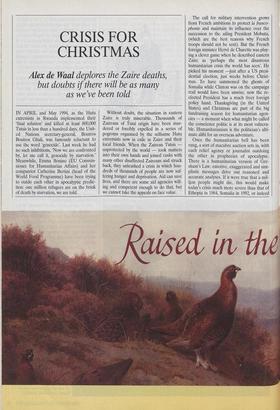CRISIS FOR CHRISTMAS
Alex de Waal deplores the Zaire deaths,
but doubts if there will be as many as we've been told
IN APRIL and May 1994, as the Hutu extremists in Rwanda implemented their `final solution' and killed at least 800,000 Tutsis in less than a hundred days, the Unit- ed Nations secretary-general, Boutros Boutros Ghali, was famously reluctant to use the word 'genocide'. Last week he had no such inhibitions, 'Now we are confronted by, let me call it, genocide by starvation.' Meanwhile, Emma Bonin() (EU Commis- sioner for Humanitarian Affairs) and her compatriot Catherine Bertini (head of the World Food Programme) have been trying to outdo each other in apocalyptic predic- tion: one million refugees are on the brink of death by starvation, we are told. Without doubt, the situation in eastern Zaire is truly miserable. Thousands of Zaireans of Tutsi origin have been mur- dered or forcibly expelled in a series of pogroms organised by the selfsame Hutu extremists now in exile in Zaire and their local friends. When the Zairean Tutsis unprotected by the world — took matters into their own hands and joined ranks with many other disaffected Zaireans and struck back, they unleashed a crisis in which hun- dreds of thousands of people are now suf- fering hunger and deprivation. Aid can save lives, and there are some aid agencies will- ing and competent enough to do that, but we cannot take the appeals on face value. The call for military intervention grows from French ambitions to protect la franca- phonie and maintain its influence over the succession to the ailing President Mobutu, (which are the best reasons why French troops should not be sent). But the French foreign minister Helve de Charette was play- ing a clever game when he described eastern Zaire as 'perhaps the most disastrous humanitarian crisis the world has seen'. He picked his moment —just after a US presi- dential election, just weeks before Christ- mas. To have summoned the ghosts of Somalia while Clinton was on the campaign trail would have been unwise; now the re- elected President has a much freer foreign policy hand. Thanksgiving (in the United States) and Christmas are part of the big fundraising season for humanitarian agen- cies — a moment when what might be called the conscience politic is at its most vulnera- ble. Humanitarianism is the politician's ulti- mate alibi for an overseas adventure.
Once the humanitarian bell has been rung, a sort of macabre auction sets in, with each relief agency or journalist outdoing the other in prophecies of apocalypse. There is a humanitarian version of Gre- sham's Law: emotive, exaggerated and sim- plistic messages drive out reasoned and accurate analyses. If it were true that a mil- lion people might die, this would make today's crisis much more severe than that of Ethopia in 1984, Somalia in 1992, or indeed any other famine since demographic records began. Evidence for a calamity on such a scale is lacking — and the agencies' credibil- ity is open to question.
Remember Somalia in November 1992, when the UN said two million would die unless troops were sent? The world heeded the call. Few toiled through the independent review of the operation that concluded that Operation Restore Hope saved between 10,000 and 25,000 lives — at a cost of mak- ing the civil war more intractable. Remem- ber BandAid at Christmas 1984? Sudan, Christmas 1990? In no case did the predict- ed millions die, with or without aid. The best news from Africa is that Africans are more expert at surviving famines than Unicef or Medecins Sans Frontieres.
Or indeed, who read the independent review of the international response to Rwanda 1994, commissioned by the OECD? Many middle-ranking aid agency staff did, and they have been earnestly say- ing that it is vital not to repeat the mis- takes of that operation. Paramount among those blunders was to rush in without a good political assessment and set up huge camps, which became the extremists' bases, protected by the camps' civilian Population and fed by what is euphemisti- cally called 'diversion' of humanitarian aid. Sale of surplus aid helped to finance arms- buying sprees. A good proportion of $2 bil- lion in foreign aid enabled a clique of genocidal maniacs to remain in business and begin their killing again, albeit more slowly this time.
There is a litany of other errors. A par- ticularly interesting one was the French army's five-fold inflation of the number of Tutsis it had protected. Another was Boutros Ghali's preference for making policy on the basis of the New York Times rather than the cables from his representa- tive in Kigali.
But all the soul-searching of the best aid workers counts for very little when it is trumped by 'a million dead by Christmas'. Those of us who dare to question the accu- racy of the figures are treated as callous Malthusians, like the infamous Nassau Senior who doubted that the Irish famine would kill more than a million people, which 'would not be enough to do any good'. In Somalia, voices of caution were drowned out. Now, at least we are given a hearing. The next step will be to recognise why we are advocating such caution — it is because we genuinely care. Aid that is based on a correct assessment of the situation will save more lives than. aid that is given in a moral and practical panic. Professionalism is more important than assuaging con- sciences. Doing less may achieve more.
If a million were about to die, it would be fully justifiable to intervene by force of arms and wreak havoc on the politics of central Africa. If it is not true, then a bal- ance can be struck between the charitable imperative and the need to seek political solutions. Most important among the latter is removing the genocidaires from the polit- ical map. If an international force cannot do it (and it would entail fighting a war), then at least the Zairean rebels should not be stopped from doing it, and the Zaireans can begin to settle their own differences, hopefully by talking. Judging by the record, French involvement will hinder rather than help both of these processes.
In the meantime, humanitarians must weigh their conflicting duties. These are deep dilemmas without easy solutions, but at least there is a long history of grappling with them which can help inform the choic- es. Article 23 of the Fourth 1949 Geneva Convention is one source of guidance: it states that relief in wartime should be pro- vided only when there are full guarantees that it will not bring material gain to a bel- ligerent. As in Europe in the 1940s, guns, grenades and genocidal ideology are the main instruments of death in central Africa today, not hunger and disease. Let us bring back the genuine humanitarianism of the men and women who drafted those con- ventions, and not the counterfeit version of the international bureaucrats who are try- ing to arrogate the world's conscience.
The author is co-director of the London-based human rights organisation, African Rights.



















































































 Previous page
Previous page